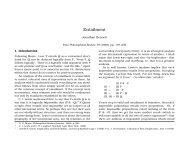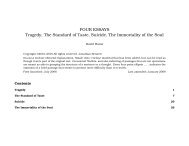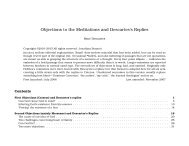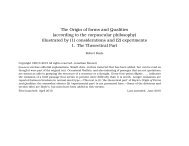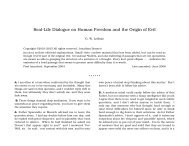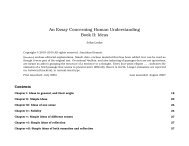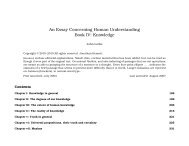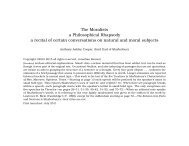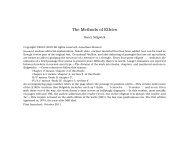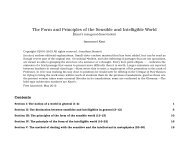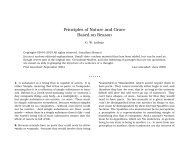A Vindication of the Rights of Woman with - Early Modern Texts
A Vindication of the Rights of Woman with - Early Modern Texts
A Vindication of the Rights of Woman with - Early Modern Texts
You also want an ePaper? Increase the reach of your titles
YUMPU automatically turns print PDFs into web optimized ePapers that Google loves.
The <strong>Rights</strong> <strong>of</strong> <strong>Woman</strong> Mary Wollstonecraft 9: Unnatural distinctions<br />
[Then a scornful paragraph about how a minister can ply<br />
his trade, pretending to care about <strong>the</strong> poor and unfortunate<br />
but doing nothing for <strong>the</strong>m. MW continues:] Let me return to<br />
<strong>the</strong> more specious slavery that chains <strong>the</strong> very soul <strong>of</strong> woman,<br />
keeping her for ever under <strong>the</strong> bondage <strong>of</strong> ignorance.<br />
The preposterous distinctions <strong>of</strong> rank that make civilization<br />
a curse by dividing <strong>the</strong> world between •voluptuous<br />
tyrants and •cunning envious dependents corrupt every class<br />
<strong>of</strong> people almost equally; because <strong>the</strong> respect a person gets<br />
depends only on his rank, and not to his performance <strong>of</strong><br />
his duties to o<strong>the</strong>rs; and when <strong>the</strong> duties are neglected <strong>the</strong><br />
affections can’t gain enough strength to fortify <strong>the</strong> virtue <strong>of</strong><br />
which <strong>the</strong>y are <strong>the</strong> natural reward. There are some loop-holes<br />
out <strong>of</strong> which a man may creep, and dare to think and act for<br />
himself; but for a woman it is a Herculean task because <strong>the</strong><br />
female sex faces difficulties <strong>of</strong> its own that require almost<br />
superhuman powers to overcome.<br />
A truly benevolent legislator always tries to make it in<br />
<strong>the</strong> interests <strong>of</strong> each individual to be virtuous; this makes<br />
private virtue become <strong>the</strong> cement <strong>of</strong> public happiness, so that<br />
an orderly whole is consolidated by <strong>the</strong> tendency <strong>of</strong> all <strong>the</strong><br />
parts towards a common centre. But <strong>the</strong> private or public<br />
virtue <strong>of</strong> women is very problematic because many male<br />
writers, including Rousseau, insist that a woman should<br />
throughout her life be subjected to <strong>the</strong> severe restraint <strong>of</strong><br />
propriety. Why subject her to propriety—blind propriety—if<br />
she is capable <strong>of</strong> acting from a nobler spring, i.e. if she has<br />
inherited immortality [see Glossary]?. . . .<br />
[MW returns to her old <strong>the</strong>me <strong>of</strong> women being given <strong>the</strong><br />
wrong kind <strong>of</strong> attention by men etc. One item in this is new:<br />
‘The laws respecting woman, which I mean to discuss in a<br />
future part, make an absurd unit <strong>of</strong> a man and his wife;<br />
and <strong>the</strong>n by <strong>the</strong> easy transition <strong>of</strong> considering only him as<br />
responsible she is reduced to a mere cipher, ·a nothing·.<br />
87<br />
[Then a great deal more <strong>of</strong> <strong>the</strong> old <strong>the</strong>me. In <strong>the</strong> course<br />
<strong>of</strong> dealing <strong>with</strong> Rousseau’s statement that women’s lower<br />
status is shown by <strong>the</strong> fact that <strong>the</strong>y can’t fight in wars, MW<br />
remarks in passing that ‘defensive war’ is ‘<strong>the</strong> only justifiable<br />
war’. And she works her way around to a brief consideration<br />
<strong>of</strong> <strong>the</strong> poor:] What can be a more melancholy sight to a<br />
thinking mind than to look into <strong>the</strong> numerous carriages<br />
that drive helter-skelter about London in a morning, full <strong>of</strong><br />
pale-faced creatures who are flying from <strong>the</strong>mselves. I have<br />
<strong>of</strong>ten wished, <strong>with</strong> Dr Johnson, to place some <strong>of</strong> <strong>the</strong>m in<br />
a little shop <strong>with</strong> half a dozen children looking up to <strong>the</strong>ir<br />
languid countenances for support. If that happened, I think<br />
that some latent vigour would soon give health and spirit to<br />
<strong>the</strong>ir eyes; and some lines drawn by <strong>the</strong> use <strong>of</strong> reason on <strong>the</strong><br />
blank cheeks. . . .might restore lost dignity to <strong>the</strong> character,<br />
or ra<strong>the</strong>r enable it to attain <strong>the</strong> true dignity <strong>of</strong> its nature.. . . .<br />
Besides, when poverty is more disgraceful even than vice,<br />
isn’t morality cut to <strong>the</strong> quick? Still to avoid misconstruction,<br />
though I consider that women in <strong>the</strong> common walks <strong>of</strong><br />
life are called by religion and reason to fulfil <strong>the</strong> duties<br />
<strong>of</strong> wives and mo<strong>the</strong>rs, I can’t help lamenting that women<br />
higher up <strong>the</strong> social scale don’t have a road along which<br />
<strong>the</strong>y can pursue more extensive plans <strong>of</strong> usefulness and<br />
independence. . . . I really think (don’t laugh!) that women<br />
ought to have ·parliamentary· representatives, instead <strong>of</strong><br />
being arbitrarily governed <strong>with</strong>out being allowed any direct<br />
share in <strong>the</strong> deliberations <strong>of</strong> government. This is just a hint;<br />
I mean to pursue it at some future time.<br />
But <strong>the</strong> whole system <strong>of</strong> ‘representation’ in this country is<br />
at present only a convenient label for despotism; so women<br />
needn’t complain, because <strong>the</strong>y are as well represented as<br />
a numerous class <strong>of</strong> hard-working mechanics who pay for<br />
<strong>the</strong> support <strong>of</strong> royalty when <strong>the</strong>y can scarcely put bread in<br />
<strong>the</strong>ir children’s mouths. Men whose very sweat •supports



